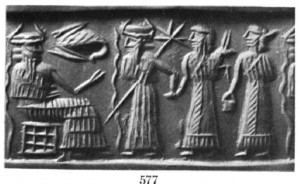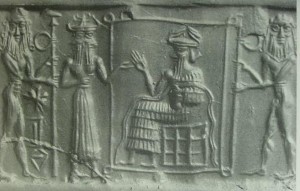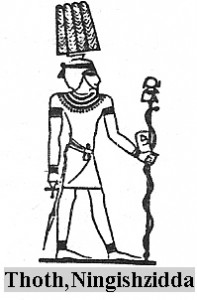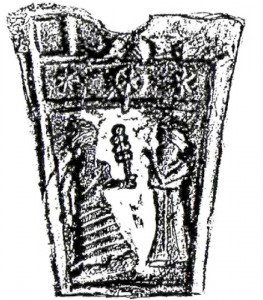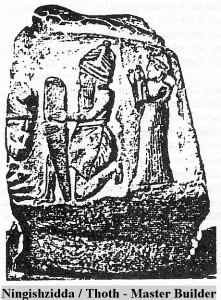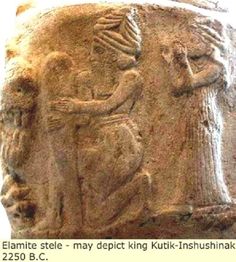Translated by D. Mallet
(Texts: All Artifacts, Color Coding, & Writings in Bold Type With Italics Inside Parenthesis, are Added by Editor R. Brown, not the Authors, Translators, or Publishers!)
(gods in blue)
This hymn to Osiris is engraved on a semi-circular stele of limestone which forms part of the collection of the Bibliothèque Nationale at Paris. It comprises 28 lines of hieroglyphics, in a very good state of preservation, excepting only that the name of the god Amon, which once figured in several proper names, has been carefully chiselled out, in the age of the so-called heretic kings Khu-n-Aten (Amenophis IV) and his successors.
1. “Adoration to Osiris by the superintendent of the oxen, Amon-em-ha son of the lady Nofri-t-ari. He says: Homage to thee, Osiris, lord of eternity, king of the gods with the thousand names,1 with the sacred existences,2 with the secret acts3 in the temples; he is rich in Ka4 in Tattu,5 holding property6
2. in Sokhem,7 master of the sacred dances8 in Busiris, prince of abundance9 in On,10 master of remembrance in Mati,11 hidden soul, master of Kerer,12 venerated in the Memphite nome;13 the soul whose body itself is Ra, who reposes in
3. Hnes;1 dispensing benefits2 in Nart,3 when his soul awakens, master of the great dwelling of Shmun,4 very valiant5 in Shashotep,6 lord of eternity, the first in Abydos; distant is his domain in To-Sar,7 stable is
4. his name in the mouth of mankind; he who contains the double ennead of the double land; Tum who nourishes the doubles, first of the divine ennead, perfect ghost among the ghosts.8 The Nu9 has procured for him his water,10 the wind of the north has brought him food,11 the air enters his nostrils, to refresh his heart,
5. to strengthen his heart.12 The soil has produced for him provisions, the vault of heaven has brought13 unto him its stars; the wide gates open for him, the master of acclamations in the southern sky, of adorations in the northern sky. The indestructible ones
6. are under the place of his face, the immortals are his abodes.14 When he has gone forth in peace by the order of Seb, the divine ennead adores him, the inhabitants of the tuau1 prostrate themselves to the ground, the mighty2 bow the head, the ancestors3 are in prayer.
7. When they beheld him, the august dead4 submit to him, the two lands together5 unite to render glory to him, marching before his majesty. Glorious noble among the nobles6 from whom proceeds [all] dignity, who establishes supreme authority,7 excellent chief of the ennead of the gods, with charming aspect,
8. beloved of him who has contemplated him, extending his terror through all countries that they may proclaim his name before all others.8 All make offerings unto him, even to him the master whose memory (is eternal) in heaven as on the earth. Manifold are the shouts during the festival of Uaga9; the two lands are united to celebrate the funeral dances.10
9. The great prince, eldest of his brothers, the chiefs11 of the divine enneads, who establishes the truth in thedouble land, who seats the son on the throne of his father, the favorite of his father Seb, the beloved of his mother Nut; very valiant, he overthrows the impious; strong of arm, he immolates
10. his adversary, breathing terror upon his enemies, conquering the distant frontiers of the wicked.1 Firm of heart, his feet are vigilant. Flesh2 of Seb, royalty3 of the two lands, [Seb] contemplates his benefits, he has ordered him to govern
11. [all] countries to assure their prosperity.4 He has fashioned this earth with his hand, [with] its waters, its atmosphere, its vegetation, all its large cattle, all its wild birds, all its domesticated birds,5 its reptiles and its game.
12. The desert carries its tribute to the son of Nut, Egypt is happy when it sees him appear on the throne of his father. Like Ra (Marduk) he rises on the horizon, he creates light on the face of the darkness; he has illuminated Shu6 by the help of his two feathers, he has inundated the earth like
13. the (solar) disk at dawn. His white crown pierces the vault of heaven fraternizing with the stars, guides7 of all the gods. Accomplished are the commands of his voice; [for he is the] favorite of the great ennead, the chosen of the small divine ennead. His sister has saved him, scattering the rebels,
14. repelling8 evil, uttering the word with the incantations9of her mouth. Expert is her tongue, voice is not wanting to her, and her speech is effectual. [For she is] Isis the charmer, the avenger of her brother, who seeks him without failing,
15. who traverses this earth with lamentations, without resting1 before she has found him, creating the light with her feathers, producing the wind with her wings, celebrating the sacred dances and depositing her brother in the tomb,
16. raising2 the remains of the god with the immovable heart;3 inhaling his seed, making flesh,4 suckling the infant5 in solitude without any knowing where he is.6 She makes him grow, his arm becomes strong in the great dwelling
17. of Seb. The divine ennead rejoices, when the son of Osiris comes, even Horus7 with the firm heart, with the just voice,8 the son of Isis, the flesh of Osiris (Ashur). He has assembled the chiefs of truth,9 the divine ennead, [he] himself the universal master.10 The lords of truth collected there
18. cast sin afar from them,11 seated in the vast dwelling-place of Seb, to establish the dignity of him who is their master, the royalty of justice who resides there. Horus has been found of just voice; to him has been given the office of his father. The diadem has come to him by the order of Seb;
19. he has assumed the dominion of the double land, the white crown being established on his head. He has valued1 the earth with all it contains; heaven and earth are under the place of his face;2 [Seb] has made him command mankind, the spirits,3 the race of the men of Egypt, the Ha-neb-u.4 The circle
20. of the solar disk is under his orders, winds, river, inundation, fruit trees5 as well as all the annual plants. As the god Nepri6 he makes all his herbage, the wealth of the soil, to grow; he ascends and all are satiated; he spreads7 himself through all lands.
21. All that exists breathes; (all) hearts are happy, (all) breasts rejoice. Every being invokes him, every man adores his beauties. Delightful for us is his love; his grace environs the heart; great is his love in all the reins. One offers
22. unto the son of Isis his enemy overthrown by his vigor. The author of evil pronounces magical words and displays his power in his turn;8 [but] the son of Isis makes his way unto him, he avenges his father, sanctifying and honoring9 his name. Terror is calmed;
23. her domain is extended, is strengthened according to the laws which he10 dictates. The paths are cleared, the roads are opened, evil flies away; the earth,fertilised by its lord, teems1 with produce. Established is the truth
24. for its master; sin is pursued; happy is thy heart, O Unnofré.2 The son of Isis has assumed the white crown, he has caused the authority of his father to be recognized in the great dwelling of Seb. Ra is his word, Thoth (Ningishzidda) are his writings.
25. The divine chiefs3 are happy, [for] what thy father Seb has ordained for thee, that is executed when he has spoken.
___________________
Divine oblation to OsirisKhent-Amenti , lord of Abydos, so that he may give good funeral offerings of bread, liquids, oxen, geese, cloths, incense, perfumes
26. and all vegetable products; [so that he may grant] to grow,4 to take possession of the Nile, to appear in the form of a living soul, to see the (solar) disk at dawn, to enter and depart by the ro-sta-u;5 so that the soul may not be driven into the other world, but be received
27. among those who chant in the presence of Un-nofré and who share in the offerings laid upon the altar of the great god; so that it breathes the delicious breezes of the north and drinks of the current
28. of the river. To the double of the superintendent of the oxen of Amon, Amon-mes, of the just voice, born of the lady Hont, of the just voice, his wife who loves him [Nofri-t-ari].
Footnotes
17:1 Compare the epithet ”with a myriad of names” often applied to Isis by the Greeks (Plutarch: de Isid. et Osirid. 53). A Greek inscription in the Louvre (No. 2) calls her “many-named.” The same expression is used of Amon.
17:2 Kheperu is usually translated here “transformations.” But Osiris is never transformed and khoper merely signifies “to be” or “become.”
17:3 Ar-u or it-u has no determinative; it appears to refer to the ceremonies performed in the temples rather than to the forms of the god.
17:4 The Ka is the double of the individual; the gods and sometimes men themselves have several; at Mendes Osiris doubtless had quite a series of them inherent in his sacred statues.
17:5 Mendes.
17:6 Or perhaps, “great nourisher.”
17:7 Letopolis.
17:8 The word is several times determined in this stele by the figure of a dancing man, so that it must refer to dances in the temple performed in honour of the god.
17:9 Literally “provisions of victualling.”
17:10 Heliopolis, the On of the Old Testament, the daughter of whose priest was married by Joseph.
17:11 Unidentified locality. It is the name of the Hall of Truth where Osiris and his assessors judge the souls of the dead.
17:12 Perhaps Paqrur, Phagroriopolis. In the tomb of Bok-en-ranf near Saqqarah, Osiris also is named “master of Kerer”; in the temple of Seti I. at Qurnah, Anubis has the same title.
17:13 “The White Wall.”
18:1 Herakleopolis, now the mounds of Ahnas el-Medîneh, S.E. of the Fayoum. It is the Hanes of the Old Testament (Isai. xxx. 4).
18:2 Literally “beneficent in useful things”: hannu here has no determinative.
18:3 A locality near Hanes and often identified with the latter.
18:4 Hermopolis Magna.
18:5 Literally “great with the double solar force.”
18:6 Shotb, capital of the Hypselite nome, S. of Assiout.
18:7 “The sacred land.”
18:8 Khu, “luminous,” and hence “a magic power,” often applied to the dead as having become luminous.
18:9 The primordial water or abyss. Compare “the deep” of Gen. i. 2.
18:10 Khenp is usually rendered “to extract.” But the Nu is anterior to Osiris, and therefore gives instead of receiving his water. Moreover the construction seems to make this explanation necessary.
18:11 Meses, “the night,” more especially that which precedes the New Year, and hence the feast which took place then in honor of Osiris (Brugsch, Dict., 700).
18:12 Perhaps the word I have read rut-u should be decomposed into rtu renpet-i-u, “to give the productions of the year (to his heart).”
18:13 Or “has submitted to him.”
18:14 The two compound words in parallelism here, akimbo-u sek-u, akhim-u urtt-u, have been translated: “the fixed stars” and “the wandering stars” or planets, as well as “stars which always remain on the horizon,” and “stars which are there only at certain hours.” These distinctions are not proved; and it is best to adhere to the literal sense of the words.
19:1 The other world, which in Egyptian belief was not under the earth but beyond its limits; see Maspero, Revue de l’Histoire des Religions, 1887.
19:2 The word read t’at’a-u by Chabas seems to be tes-ti-u, “those who are exalted,” and forms a natural antithesis to kes-u, “bent.”
19:3 T’er-ti-u and not t’era-u (“all”), that is the common herd of the dead, the ancestors of men in general, in opposition to the tes-ti-u or “mighty.”
19:4 Nti-u am, “those who are below,” a vague expression, euphemistic for “the dead.”
19:5 Literally “in a single place.”
19:6 Sahu probably denotes the higher officials.
19:7 Hiq is a feudal prince, and hiq-t the absolute authority he possessed in his domain, large or small, whether composed of several names or of less extent than a single name. The title is often applied to the kings, though not as kings of all Egypt.
19:8 Literally “in advance.”
19:9 One of the great festivals of Osiris when lamps were lit throughout Egypt (see Herodotos ii. 62).
19:10 Ahi is, like hannu, determined by the figure of a dancing man. As the festival was in honor of the dead, the dances would have had a funereal character.
19:11 Ur-u is in the plural, and consequently must be construed with the preceding word.
20:1 Literally, “bringing on the frontiers,” often applied to conquering kings.
20:2 Or “heir.”
20:3 As in English, abstract terms are sometimes used of persons.
20:4 Literally, “to conduct the countries to prosperity.”
20:5 Pai are the birds who fly freely through the air, khenen those who rest, probably therefore domestic fowls or perhaps water-fowl.
20:6 Shu sometimes means “the shade,” but here it seems to denote either the god Shu himself or the space which he occupies between the earth and the sky, uplifting, like Atlas, the celestial vault with his two arms.
20:7 Sem-u also signifies “image,” a sense which would suit here very well, the stars being images or manifestations of each god. The absence of a determinative makes a decision difficult.
20:8 “Making turn,” literally.
20:9 Khu, the magic charms which enable the gods and more especially Isis to triumph.
21:1 Khen used of birds who remain stationary. Elsewhere Isis is winged.
21:2 Putting them one on the other so as to reconstitute the mutilated body of Osiris.
21:3 That is Osiris.
21:4 Or “an heir.”
21:5 Horus, born of Isis and the revivified Osiris.
21:6 Isis hid herself in the marshes of the Delta with Horus in order to rear him in peace.
21:7 In the text “Osiris son Horus.” This way of expressing affiliation belongs to the age of the twelfth dynasty, e.g. in the tomb of Khnum-hotep at Beni-Hassan, where we have “Neheri son Khnum-hotep,” i.e. Khnum-hotep son of Neheri (Cf. Lepsius, Denkmäler, iv. pl. 126 sqq.).
21:8 M. Maspero explains this expression, which is used generally of the defunct, in a material sense, “he whose voice knows the correct intonation in reciting prayers and formula.” M. Grébaut and most Egyptologists take it in a moral sense: “true of speech,” “truth speaking.”
21:9 The acolytes who sit with Osiris in the Hall of Truth.
21:10 Perhaps this merely signifies “the entire god” who now has all his limbs.
21:11 Literally “put behind them.”
22:1 Properly, “count,” “reckoning.” The same metaphor occurs in the Bible.
22:2 Compare the Biblical expression in Psalm lx. 13.
22:3 Rekhi-u “the intelligent,” “those who know,” frequently used of the dead.
22:4 “All those of the north,” i.e. all the inhabitants of the islands and coasts of the Mediterranean. In later times the term was specially used of the Greeks.
22:5 Or perhaps “trees which last,” in opposition to plants which die and revive each year.
22:6 The grain-god who presided over cereals, vegetation, and the products of the earth. Amon-Ra is also called Nepri in the hymn contained in the Bulaq Museum (pl. viii. Grébaut, Hymne à Amon-Ra, p. 21).
22:7 Properly, “every face.”
22:8 Literally “his time.”
22:9 Or “rendering beneficent.”
22:10 Horus or Osiris.
23:1 The determinative of the legs seems to contradict this rendering, but I can find no other signification for the word aura, wuru, and we are compelled to admit a grammatical error.
23:2 “The good being,” Osiris.
23:3 Those who sit with Osiris in the Hall of Judgment.
23:4 Khopiru, “the becomings.”
23:5 The corridors or defiles which led (like the defiles of the mountain-cliffs to the west of Abydos) from this world to the next.”
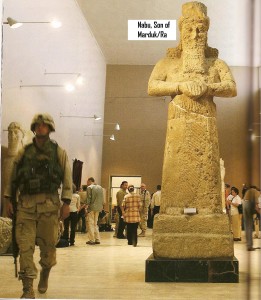
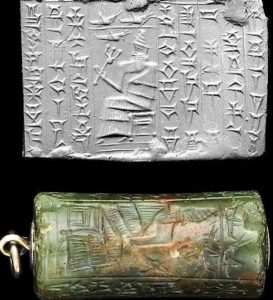
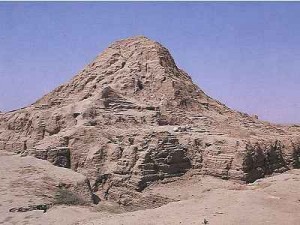
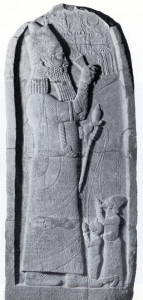
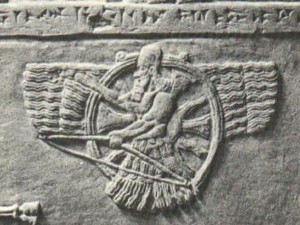
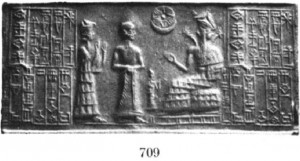
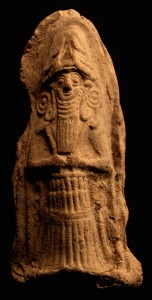
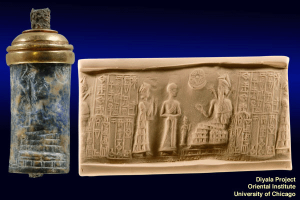

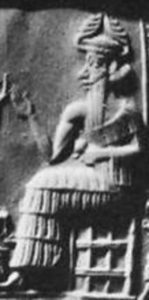
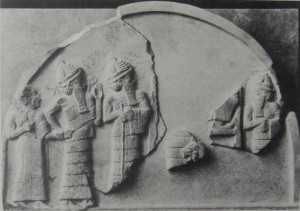
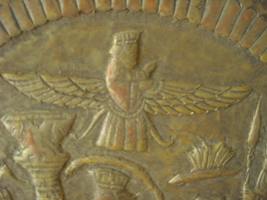
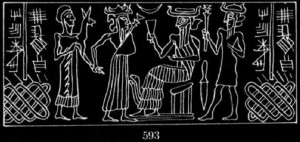
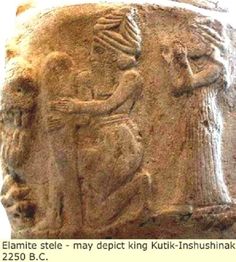
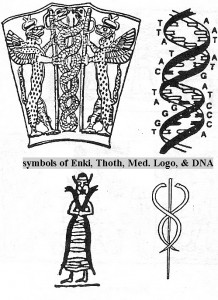
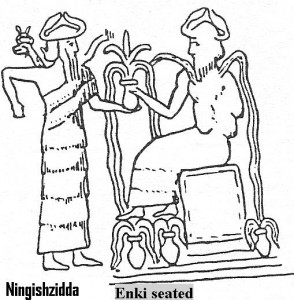 (
(